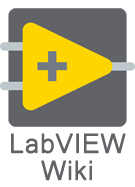GDevCon North America 2023/Chippin' Away: Managing Roadblocks: Difference between revisions
m Add infobox |
m Use presentation template, remove superfluous amboxes |
||
| Line 6: | Line 6: | ||
}} | }} | ||
{{presentation | |||
|presenters=Eric Stach | |||
|abstract=In Duke University’s Mechanical Engineering Department, we developed a tabletop ice surface to demonstrate collision mechanics as a teaching lab exercise. The intention was to mimic the ice surface used in the sport of curling and measure the position of colliding granite stones versus time. The surface was created using a chiller pumping a subzero ethylene glycol and water mixture through copper tubes sandwiched between aluminum plates. Data acquisition was done using a webcam mounted above the surface and LabVIEW Vision. | |||
My presentation would focus on how I tackled the data acquisition and LabVIEW development from start to finish. Starting with zero machine vision experience (and up until I began the project didn’t even know you could use a webcam in LabVIEW!), I’ll highlight the steps that I took to break down this larger problem into a series of smaller steps: can I take a still image? Can I take a video? Can I playback? Can I identify the same object through multiple frames of a video? Can I calibrate pixels to distance? Can I track multiple objects at once? I’ll also talk about the many ways that I failed along the way (why is it confusing my two objects??) before reaching the final application and the subsequent lessons learned. | |||
My approach was to play with each of these features in a “sandbox” before implementing them in the final application. At GDevConNA 2022, Katya Prince gave a fantastic presentation on machine vision. My presentation would echo similar points with regard to machine vision tips and tricks; however, I’d focus more on the problem-solving approach and hone into some of the lower level functions rather than use the Vision Assistant. | |||
|youtube-id=4mAcb0o4Wbk | |||
}} | |||
==Presentation links== | |||
==Presentation | |||
* [https://youtu.be/4mAcb0o4Wbk Presentation on YouTube] | * [https://youtu.be/4mAcb0o4Wbk Presentation on YouTube] | ||
[[Category:GDevCon N.A. 2023]] | [[Category:GDevCon N.A. 2023]] | ||
Latest revision as of 17:29, 15 August 2024
| Chippin' Away: Managing Roadblocks | |
|---|---|
| Conference | GDevCon North America 2023 |
| Presenters | Eric Stach |
In Duke University’s Mechanical Engineering Department, we developed a tabletop ice surface to demonstrate collision mechanics as a teaching lab exercise. The intention was to mimic the ice surface used in the sport of curling and measure the position of colliding granite stones versus time. The surface was created using a chiller pumping a subzero ethylene glycol and water mixture through copper tubes sandwiched between aluminum plates. Data acquisition was done using a webcam mounted above the surface and LabVIEW Vision.
My presentation would focus on how I tackled the data acquisition and LabVIEW development from start to finish. Starting with zero machine vision experience (and up until I began the project didn’t even know you could use a webcam in LabVIEW!), I’ll highlight the steps that I took to break down this larger problem into a series of smaller steps: can I take a still image? Can I take a video? Can I playback? Can I identify the same object through multiple frames of a video? Can I calibrate pixels to distance? Can I track multiple objects at once? I’ll also talk about the many ways that I failed along the way (why is it confusing my two objects??) before reaching the final application and the subsequent lessons learned.
My approach was to play with each of these features in a “sandbox” before implementing them in the final application. At GDevConNA 2022, Katya Prince gave a fantastic presentation on machine vision. My presentation would echo similar points with regard to machine vision tips and tricks; however, I’d focus more on the problem-solving approach and hone into some of the lower level functions rather than use the Vision Assistant.
